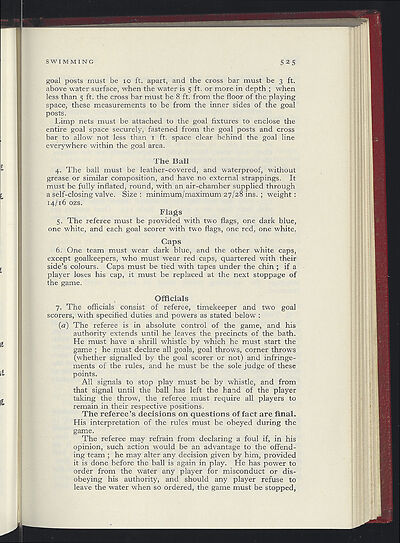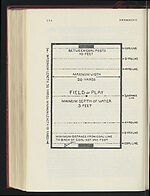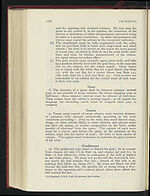1938-39
(555)
Download files
Complete book:
Individual page:
Thumbnail gallery: Grid view | List view

E
E
SWIMMING
525
goal posts must be io ft. apart, and the cross bar must be 3 ft.
above water surface, when the water is 5 ft. or more in depth ; when
less than 5 ft. the cross bar must be 8 ft. from the floor of the playing
space, these measurements to be from the inner sides of the goal
Posts.
Limp nets must be attached to the goal fixtures to enclose the
entire goal space securely, fastened from the goal posts and cross
bar to allow not less than i ft. space clear behind the goal line
everywhere within the goal area.
The Ball
4. The ball must be leather-covered, and waterproof, without
grease or similar composition, and have no external strappings. It
must be fully inflated, round, with an air-chamber supplied through
a self-closing valve. Size: minimum/maximum 27/28 ins. ; weight:
14/16 ozs.
Flags
5. The referee must be provided with two flags, one dark blue,
one white, and each goal scorer with two flags, one red, one white.
Caps
6.
One team must wear dark blue, and the other white caps,
except goalkeepers, who must wear red caps, quartered with their
side's colours. Caps must be tied with tapes under the chin ; if a
player loses his cap, it must be replaced at the next stoppage of
the game.
Officials
7. The officials consist of referee, timekeeper and two goal
scorers, with specified duties and powers as stated below :
(a) The referee is in absolute control of the game, and his
authority extends until he leaves the precincts of the bath.
He must have a shrill whistle by which he must start the
game ; he must declare all goals, goal throws, corner throws
(whether signalled by the goal scorer or not) and infringe-
ments of the rules, and he must be the sole judge of these
points.
All signals to stop play must be by whistle, and from
that signal until the ball has left the hand of the player
taking the throw, the referee must require all players to
remain in their respective positions.
The referee's
decisions on questions of fact are final.
His interpretation of the rules must be obeyed during the
game.
The referee may refrain from declaring a foul if, in his
opinion, such action would be an advantage to the offend-
ing team; he may alter any decision given by him, provided
it is done before the ball is again in play. He has power to
order from the water any player for misconduct or dis-
obeying his authority, and should any player refuse to
leave the water when so ordered, the game must be stopped,
E
SWIMMING
525
goal posts must be io ft. apart, and the cross bar must be 3 ft.
above water surface, when the water is 5 ft. or more in depth ; when
less than 5 ft. the cross bar must be 8 ft. from the floor of the playing
space, these measurements to be from the inner sides of the goal
Posts.
Limp nets must be attached to the goal fixtures to enclose the
entire goal space securely, fastened from the goal posts and cross
bar to allow not less than i ft. space clear behind the goal line
everywhere within the goal area.
The Ball
4. The ball must be leather-covered, and waterproof, without
grease or similar composition, and have no external strappings. It
must be fully inflated, round, with an air-chamber supplied through
a self-closing valve. Size: minimum/maximum 27/28 ins. ; weight:
14/16 ozs.
Flags
5. The referee must be provided with two flags, one dark blue,
one white, and each goal scorer with two flags, one red, one white.
Caps
6.
One team must wear dark blue, and the other white caps,
except goalkeepers, who must wear red caps, quartered with their
side's colours. Caps must be tied with tapes under the chin ; if a
player loses his cap, it must be replaced at the next stoppage of
the game.
Officials
7. The officials consist of referee, timekeeper and two goal
scorers, with specified duties and powers as stated below :
(a) The referee is in absolute control of the game, and his
authority extends until he leaves the precincts of the bath.
He must have a shrill whistle by which he must start the
game ; he must declare all goals, goal throws, corner throws
(whether signalled by the goal scorer or not) and infringe-
ments of the rules, and he must be the sole judge of these
points.
All signals to stop play must be by whistle, and from
that signal until the ball has left the hand of the player
taking the throw, the referee must require all players to
remain in their respective positions.
The referee's
decisions on questions of fact are final.
His interpretation of the rules must be obeyed during the
game.
The referee may refrain from declaring a foul if, in his
opinion, such action would be an advantage to the offend-
ing team; he may alter any decision given by him, provided
it is done before the ball is again in play. He has power to
order from the water any player for misconduct or dis-
obeying his authority, and should any player refuse to
leave the water when so ordered, the game must be stopped,
Set display mode to:
![]() Universal Viewer |
Universal Viewer | ![]() Mirador |
Large image | Transcription
Mirador |
Large image | Transcription
| Games and sports in the army > 1938-39 > (555) |
|---|
| Permanent URL | https://digital.nls.uk/248743821 |
|---|
| Description | 'Games and Sports in the Army' was an annual publication produced by the British War Office between the 1930s and 1960s. This included the Second World War. It outlines the rules and regulations for games and sports played by members of the armed forces. It features names and photographs of team members, and examples of contemporary advertising. |
|---|---|
| Shelfmark | GWB.52 |

